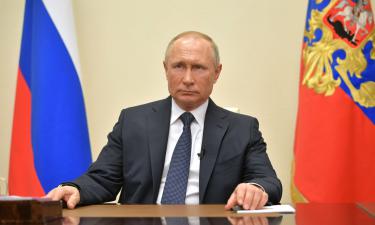Russia VS. Denmark: Who Will Lose?
Boycott of Denmark become Russia’s Idee Fixe
It is likely that because of a scoundrel whom the Denmark authorities hesitate to extradite (by the way, Russians cannot understand the reasons why it hasn’t been done yet), the two countries may face rather unfavorable problems in the economic sphere. Moreover, Russia’s recent efforts to establish closer economic cooperation between Denmark and Russia may currently come to nothing. After the hostage-taking in the Moscow theatre, the fear and hatred of the Russian people seem to have found a convenient target (by the way, compared with Chechens, it’s less dangerous simply to hate Denmark). It is strange, but today, even those who are usually considered sane appeal for boycotting Danish business and goods.
Today, President of the Russian Union of Businessmen and Industrialists Arkady Volsky openly voiced his support for those Russian businessmen who say that we should cut down the Danish imports. Arkady Volsky said in an interview that such an import reduction would have no effect on the Russian economy.
In his words, today’s competition on the international market is as great as never before. Western economies are experiencing a grave setback in production, the most serious one since the early 1970s oil crisis. It’s quite natural that Western businessmen are happy to enter any new markets. This also means that it won’t be problematic for Russia to find other sources of imports instead to replace the Danish. Arkady Volsky is sure that this measure will be a resolute response to the Danish authorities, who openly support terrorists.
To tell the truth, it seemed very strange that Copenhagen authorities allowed the World Chechen Congress with the participation of real terrorists like Ahmed Zakayev at the time when Movsar Barayev’s gang held hundreds of hostages in the Moscow theater. The obstinacy with which the Denmark authorities hesitate to extradite Ahmed Zakayev doesn’t increase Denmark’s international popularity at all. Judging by the statements of Russian politicians, it may seem that Russian troops in the Chechnya mountains are fighting not with rebellious mountain-dwellers, but with Vikings wearing horned helmets.
At the same time, Russia is perfectly right when it exerts strong political pressure upon the Danish authorities. We would like to believe that this is done not for the sake of punishing Denmark or to demonstrate our indomitable temper and invincibility. We want to believe that it’s done in order to bring the terrorists who Russian women, children, and soldiers to trial and to send them to prisons for punishment. Probably, this is also done to demonstrate to other countries of the world that it’s very dangerous to host terrorists (no matter whether they are Chechens, Arabs, or Kurds). Indeed, while there are places and people ready to host terrorists, any attempts to exterminate terrorism will be in vain. After all, the USA cannot be at war with the half the world, and Russia all the more.
However, should the Russian government jeopardize relations with the Danish government, economic especially, because of one Chechen terrorist? We should all remember that in April 2002, Russian Prime Minister Mikhail Kasyanov practically gave the green light for Danish businesses to participate in the Russian economy. Denmark’s businesses evinced great interest in investing in Russia.
In April, Mikhail Kasyanov met with Denmark’s Prime Minister Anders Fogh Rasmussen and held a round-table discussion with representatives of Denmark’s leading companies. He called upon them to establish closer cooperation in the investment sphere, the opening of Danish manufacturing in Russia, and cooperation in the energy and agro-industrial complexes (Denmark’s agriculture is the world’s best despite a rather unfavorable Scandinavian climate) and in high-tech exports. As a result, Kasyanov and Rasmussen agreed that Denmark would soon open a representative office of the Danish Investment Fund to support the investment cooperation between the two countries. Under the present-day situation, it is unlikely to be opened.
The whole situation is rather disagreeable, especially since Denmark is very much interested in investments and in the launching of its products in Russia. Even despite the fact that Russia-Denmark economic relations have not been very active so far, Danish investments managed to reach 300 million USD; the commodity turnover increased 1.7 times within several past years and made up 1.1 billion USD in 2001. It should be mentioned that the results were achieved without any considerable efforts taken by the governments of both states. It is a sufficient result of cooperation from below.
As a matter of the fact, Chairman of the Russian Union of Businessmen and Industrialists Arkady Volsky is right. Russian consumers will perfectly do without Tuborg and Carlsberg beer, Lego toys, Derby refrigerators, and hot-dogs from the Top-Stop snack bars. Moreover, the disappearance of Danish goods will cause no considerable deficit in the country at all. Other exporters will come instead. For instance, Finland, with an economy that was always very dependent upon trade with the USSR, after the breakup of the Soviet Union is no longer “a window to the world of vice and capital.” Helsinki regrets this fact very much and is actively trying to restore the frutiful cooperation that both countries had during the Soviet era.
This is all true. However, according to official statistics, Denmark is currently the only European country having red ink in the trade with Russia. In other words, Denmark buys Russian goods to the sum of 415 million USD and Russia, to the sum of 705 million USD in Denmark. this means that Danish exports to Russia consist of exclusive that Russian companies cannot produce.
According to the Russian news agency OREANDA, Russia exports oil and oil products to Denmark (the share of exports makes up 48%), fish and sea products (21%), timber and saw-timber (9%), ferrous metals (6%), fertilizers (3%), clothes (3%) and natural fur (1%). Recently, Russia started supplying Russian ships, boats, and floating vehicles to Denmark; the share of such supplies made up 1% in 2001. Danish exports to Russia consists of foodstuffs and raw materials (42%), machines and equipment (24%), furniture (3%), footwear (2%), pharmaceutical products (2%). Fifteen percent of Russia’s total meat imports are from Denmark. At that, Russia’s northwest regions are traditionally considered top-priority areas for Russia-Denmark cooperation.
We should also keep it in mind that Denmark is Russia’s largest insulin supplier; thousands of Russian people suffering from diabetes need this medicine. The problem is very pressing; a presidential program was developed for substitution of imported insulin with domestically produced insulin. Unfortunately, production of Russian insulin hasn’t started yet.
It is not ruled out that Russian diabetics, as well as millions of Russians, are indignant at the Danish authorities that openly keep aloof from the “Ahmed Zakayev problem” and let Danish police settle it. Unfortunately, Russian diabetics might die without Danish insulin. According to the information of the Russian Ministry of Health, which it reluctantly publishes at all, the death rate among diabetics using insulin domestically produced is much higher than among those using Danish insulin.
That is why when Arkady Volsky or other Russian politicians and economists call for a boycott agains Denmark in all spheres (doing so they expect to gain more points on the eve of upcoming parliamentary elections), they should remember how small the world is and all parts of it are closely interrelated.
It is not clear what Denmark will lose after Russia’s boycott; however, one thing is clear already now: Russia itself will feel rather uncomfortable because of it. Remember that even the recent war operation in Afghanistan set about three-fourths of the world’s capital in motion and became a prologue to the present-day world crisis. It is not ruled out that the boycott of Danish goods will result in a local crisis in a small and very local economy of Russia. Who is to lose in this situation then?
At the same time, this doesn’t mean that we shouldn’t seek Ahmed Zakayev’s extradition at any price. We must. However, if the Danish authorities keep on hesitating with the extradition, Russian special services should organize Zakayev’s kidnapping for a subsequent fair and open trial in Russia. This should be done the same way Israel abducted Germans after the war and Palestinian terrorists. Only after this, we will be ready to receive criticism from Denmark, the country where, unlike in Russia, Chechen terrorists are freely walking about the streets without guns, TNT, and Shakhid widows.
Dmitry Slobodanuk PRAVDA.Ru
Translated by Maria Gousseva
Read the original in Russian: http://www.pravda.ru/1/last_news_3.html
Related links:
Subscribe to Pravda.Ru Telegram channel, Facebook, RSS!





